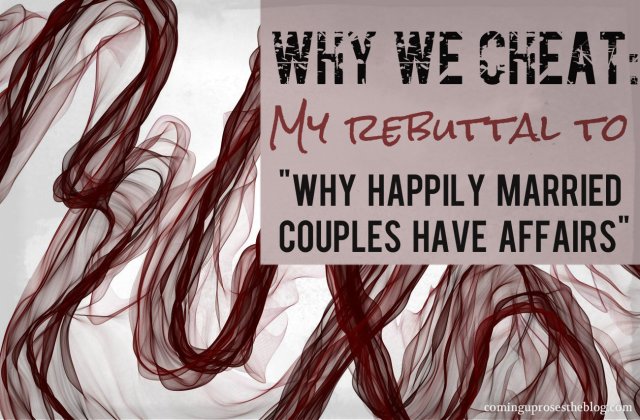I wish this all was one big April Fool’s joke. Last week, I read a less-than-lovely article by author Hanna Rosin entitled “Why we Cheat.” The subtitle read, “Spouses in happy marriages have affairs. What are we all looking for?”
This was gonna be a doozy.
She met with “the nation’s sexual healer,” Esther Perel and chatted about people who are “happily married” but choosing to sleep with people who are not their spouse. (Yup, a doozy.)
It’s a long one, but well worth it (I promise!).
In the interview, marriage is called “at best an imperfect arrangement.”
Perel says…
“If I needed to marry you to have sex for the first time and I knew that is it for the rest of my life, then infidelity becomes one of the ways to deal with those limited choices.”
– You don’t NEED to marry anyone, ever. Marriage is a choice, and in marrying someone, you are choosing to be with one person for, hypothetically, the rest of your life. If you want to choose different people to date regularly, you’re not ready to be married yet.
“We don’t want divorce – or have affairs – because we are unhappy but because we could be happier. And all that is part of the feminist deliberation. I deserve this, I am entitled to this, I can have this! It allows people to finally pursue a desire to feel alive.”
– If you want to feel alive, ride a roller coaster. Go for a long run. Climb to the top of a mountain and bask in the glory of the sun. Breathe in the salty seaside air, play with a baby, or bungee jump. Marriage is like riding a roller coaster, but you need all of the parts (the highs and the lows) of a roller coaster for it to be any ride at all, let alone a fun one.
“What’s changed is, monogamy used to be one person for life.”
– Nope, no one changed the dictionary – monogamy still means one person.
“It’s not about sex. It’s about desire, about attention, about reconnecting with parts of oneself you lost or you never knew existed. It’s about longing and loss. But the American discourse is framed entirely around betrayal and trauma.”
– It IS about sex. Or, at least, an erotic physical connection that is supposedly lacking elsewhere. Desire, attention, and constantly reconnecting with oneself – these are all attainable (or should be attainable) in a marriage. Why marry someone who pays you no attention or doesn’t desire you? That’s not saying it’s easy or a given, though. To keep your marriage alive, you have to re-desire. Re-focus attention. Re-connect, not just with yourself, but with your partner. It’s work. But when you end up longing for your spouse while you’re on your lunch break, that’s special. The “American discourse” is right – cheating IS betrayal. And I’d venture to say 97% of the time, it’s fairly to severely traumatic for whoever has been cheated on – it’s not respectable, it’s not fair, and it’s not excusable.
“Marriages are so much more merged, and affairs become a venue for differentiation, a pathway to autonomy.”
– The best relationships are not those where two halves become a whole. They’re those where two wholes become one even bigger whole – a partnership. Individuality should not be lost in a marriage – what fun would it be to co-exist with a carbon copy of yourself? Autonomy and sense of self are up to the individual to maintain.
“Women will often say: This is the one thing I know I am not doing for anyone else. I am not taking care of anyone, this is for me.”
– Damn straight, honey. Not only are you not taking care of anyone, but you’re potentially hurting someone. Badly. You’re hurting two people, because your marriage is dishonored and disrespected by your escapade towards perceived self-fulfillment. Get a manicure, hit the gym regularly, take up a new hobby or some classes. Learn a new skill or language. Cross something off of your bucket list. That’s all for you, and it’s all self-oriented. Cheating isn’t self-oriented; it’s just selfish.
Here’s the gist of it:
Millennials fear “losing themselves” after working so hard to create a sense of identity. But, marriage isn’t about losing yourself. It’s about finding yourself again, with your best friend. It’s about finding a new version of yourself to complement the single self. A version that is willing to compromise. A version that is willing to evolve.
I see marriage as a total commitment, a promise, and a covenant. There aren’t a lot of other things in our lives that come with an idea (and hopefully a plan) for permanence.
Spouses, then, are the permanent fixes in your life. They’re not meant to be switched up like brands of cereal or toilet paper.
Society promotes this constant quest for immediate self-gratification. Once you accept the idea that other people can be intimately involved in a marriage, the bond between the couple has weakened. Something else has now entered the picture. If people accept this as an option, whether they want to admit it or not, just knowing they have options and alternatives lessens the incentive to enrich the marriage itself. If the couple wants novelty and adventure, as the interview suggests, and they recognize that is what they need, then get busy with each other and add novelty and adventure! If you can do it with other people, then you can certainly do it with your spouse. Marriages go through stages as we go through years together and all the changes that happen with careers, families, aging, etc – but that doesn’t mean that’s a bad thing. We can learn and grow as individuals and as a couple if both strive to do that, and recognize that the “work” of marriage is a good thing, not something that should be viewed negatively.
Marriage isn’t supposed to be about just being sexually satisfied and happy all the time. The whole thing with marriage is the fact that’ it’s supposed to be a lifelong commitment to one person. It’s not a “I’m committed to you until I’m not fully satisfied or things get rough and I need something new.”
Couples should always be working to mix things up and try new things and evolve together. Maybe people take marriage too lightly today. That’s why divorce is so common and unhappiness is quickly claimed. It’s not fully understood how much work goes into it, but also why putting so much work into something like marriage can be actually worth it. People fail to recognize the beauty and bond that comes from experiencing life and overcoming challenges together with one person.
If someone is happy in their marriage and still has an affair, that’s an excuse. It IS betrayal.
If we want to get better at something, whether it is a relationship, a sport, a hobby, whatever – we need to invest more time, energy, attention and practice in the thing we want to improve. If you want to improve your culinary skills, you can’t do that by playing tennis. With something like a relationship, why do people think you make it better by doing the exact opposite? Staying faithful and committed require self-control and discipline and people often assume those are bad things – its why people are so quick to believe the latest diet craze – people are afraid of hard work and investing themselves.
Many today are “searching” and “looking” for happiness and love, as if it’s gonna fall down from the sky and crack them over the head. We fail to sometimes realize how much it needs to be made.
Maybe instant gratification satisfies people momentarily, but that’s what causes this ongoing unhappiness and lack of fulfillment. Marriage isn’t this test of the waters with someone. That’s what dating before marriage is for. Dating your spouse after marriage is a celebration of your decision to spend the rest of your life – yes, the rest of your life – with this one special person, accepting them for their goodnesses, quirks, and flaws, because we’re all human.
Society seems stuck on this notion that just because something can be done, than why not. I wonder if couples that are okay with open marriages were like that when they dated, too? Is that a pre-nuptial conversation they have, saying they are okay with cheating? Are some kind of cheating parameters arranged – one affair per year and it can’t last longer than 3 months? What if one partner gets more into it than the other and then the spouse decides that maybe this ain’t such a good idea after all….now what – do they go back to monogamy or split? What happens if someone’s fling becomes a real relationship and they don’t want it to end? And what about STD’s…..is that part of the conversation? Hey honey, it’s our anniversary – why don’t we both go get tested to make sure we didn’t pick something up along the way while we were achieving our personal fulfillment. Romantic, huh?
I wonder if these possibilities, as outrageous as they may sound, are considered? Because they certainly are possible. And that’s just it – especially today it seems people are so quick to jump into trends and don’t take time to really consider all the “what if’s” and long term consequences.
Perel’s best point: “Most people today…have two or three marriages in their adult life, and some of us do it with the same person. For me, this is my fourth marriage with my husband and we have completely reorganized the structure of the relationship, the flavor, the complementarity.”
Mix things up as much as you want, but do it with your spouse (and only your spouse).
What do you think about non-monogamous marriages? Is cheating acceptable once you’ve tied the knot – or at all? What does marriage even mean in today’s society?
lovelovelove,
E




